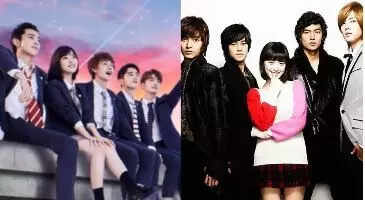The tropes are unmistakable: the stoic, heartthrob lead, the chaotic yet charming heroine, and the unexpected fantasy twist. These story elements have become staples in many popular K-dramas. However, several of these acclaimed series didn’t originate in South Korea. Before their polished Korean remakes captured international attention, many began as beloved Taiwanese or Chinese dramas.
While the K-drama versions offer sleeker production and brisker storytelling, they often retain the emotional core of the originals. Here’s a closer look at how these cross-cultural adaptations evolved – and what changed as they journeyed from Taipei and Beijing to Seoul.
Boys Over Flowers (2009)
Adaptation rather than originality propelled this drama to worldwide recognition. The storyline was born in Japan’s shōjo manga Hana Yori Dango, but television audiences first encountered it through Taiwan’s record‑breaking 2001 drama Meteor Garden, which proved that an F4 romance could dominate ratings. Eight years later South Korea presented its own, far glossier interpretation: Boys Over Flowers.
With Lee Min‑ho embodying the imperious chaebol heir and Ku Hye‑sun portraying the steadfast scholarship student, the remake flooded screens with high‑fashion styling, cinematic polish, and brisk pacing. The result launched new stars, ignited campus‑inspired trends, and recast teenage power struggles as an epic melodrama embraced well beyond Asia.
Fated to Love You (2014)
A chance encounter, an unexpected pregnancy, and a whirlwind of class conflict – this drama delivered all the makings of a classic romantic comedy. Originally a 2008 Taiwanese sensation, the story was reimagined in South Korea with Jang Hyuk and Jang Na-ra leading the cast.
While the core premise remained – a timid office worker entangled with a wealthy heir – the Korean adaptation leaned into melodrama, enriching the emotional stakes and scaling back the original’s slapstick humour. What emerged was a more heartfelt retelling, elevated by Jang Hyuk’s unpredictable energy and Jang Na-ra’s quietly powerful performance.
A Witch’s Love (2014)
Drawing inspiration from the 2009 Taiwanese drama My Queen, the Korean remake reimagines the noona romance with sharper pacing and urban flair. Uhm Jung-hwa takes the lead as a high-powered, no-nonsense tabloid reporter in her late thirties, whose reputation as a “witch” precedes her. Her world is upended by Yoon Dong-ha, a free-spirited 25-year-old played by Park Seo-joon, whose easy charm and quiet persistence begin to soften her guarded exterior.
Unlike the original’s more introspective and melodramatic tone, the Korean version thrives on fast dialogue, contemporary aesthetics, and palpable romantic tension – ultimately refreshing the genre and marking a breakout moment in Park Seo-joon’s early career.
The Time We Were Not in Love (2015)
South Korea’s take reimagines the quiet ache of the 2011 Taiwanese original into a more polished and emotionally direct romance. Starring Ha Ji-won and Lee Jin-wook, the remake transforms the slow-burning friendship into a story with clearer romantic momentum and narrative closure.
While the original unfolds with understated melancholy and realism, the Korean adaptation opts for tighter pacing, cinematic gloss, and heightened emotional clarity. With just 16 episodes, it delivers a more conventional friends-to-lovers arc – complete with scenic backdrops, playful tension, and the kind of romantic near-misses that K-dramas have made their signature.
Moon Lovers: Scarlet Heart Ryeo (2016)
Inspired by the wildly popular Chinese drama Scarlet Heart, the Korean adaptation Moon Lovers: Scarlet Heart Ryeo repositions the time-slip tale in the Goryeo Dynasty, trading Qing court politics for royal intrigue and emotional turmoil. With IU as the modern-day woman trapped in a bygone era and Lee Joon-gi leading a cast of princely rivals, the series blends sweeping romance with escalating tragedy.
While it fell short in domestic viewership, its star power, heartrending love triangle, and unforgettable ending struck a chord with global audiences. And years later, its haunting soundtrack still echoes through K-drama playlists.
A Love So Beautiful (2020)
Adapted from the 2017 Chinese youth drama, the Korean version retains much of the original’s charm while refining its storytelling for a shorter, more focused format. Set against the familiar backdrop of school uniforms and unspoken crushes, the series follows So Ju-yeon as a bright, lovestruck student and Kim Yo-han as the stoic boy next door.
Unlike its Chinese counterpart, which unfolded with a slower, more episodic rhythm, the K-drama offers tighter pacing and emotional clarity. Though it flew under the radar, its gentle portrayal of first love continues to resonate with fans drawn to soft, slow-burn romance.
Mr Queen (2020-2021)
Loosely inspired by the 2015 Chinese web drama Go Princess Go, this K-drama flips historical drama on its head with a time-travel twist and a sharp comedic edge. The story centers on a modern-day man who finds himself trapped in the body of a Joseon queen, played with electric precision by Shin Hye-sun, alongside Kim Jung-hyun’s conflicted king.
While the original leaned heavily into bawdy humour and outrageous antics, the Korean adaptation refines the chaos into a slick, gender-bending satire. Balancing farce with unexpected emotional depth and political intrigue, Mr. Queen soared in ratings and became one of tvN’s most beloved historical comedies – proof that even the most absurd concepts can strike gold with the right balance of heart and wit.
A Time Called You (2023)
A reimagining of the acclaimed 2019 Taiwanese drama Someday or One Day, the Korean adaptation offers a visually rich, emotionally layered exploration of love across timelines. Starring Ahn Hyo-seop and Jeon Yeo-been, the story follows a grieving woman who, through a mysterious twist of fate, wakes up in 1998 in the body of a teenage girl – and meets someone who looks exactly like her lost love.
While the original captivated viewers with its intricate plot and aching melancholy, the Korean version opts for a sleeker production style and tighter narrative rhythm. With nostalgic nods to late ’90s culture and a strong emotional core, the series quietly built momentum on Netflix, earning praise for its tender storytelling and striking visuals.
For all the latest K-drama, K-pop, and Hallyuwood updates, keep following our coverage here.




